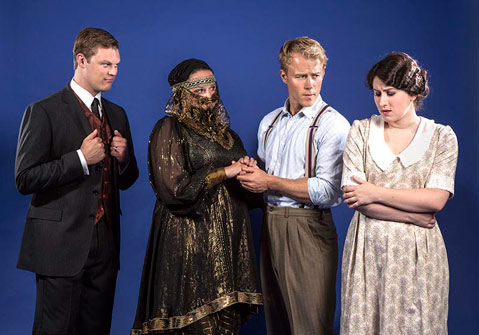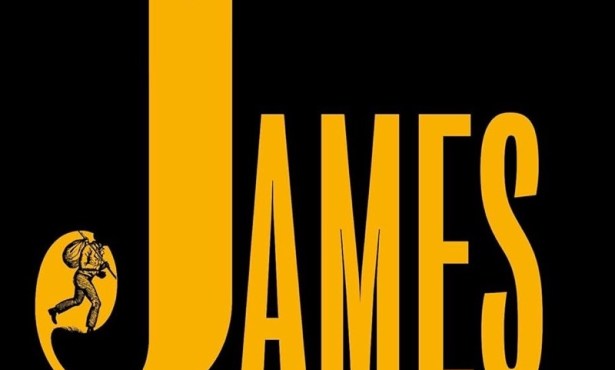The Rake’s Progress
The Music Academy Presents Stravinsky’s Opera August 3 and 5

The Rite of Spring. The Firebird. Petrushka. Igor Stravinsky’s ballets are some of the most famous, revered, and influential works in all of 20th-century music.
His operas? Not so much. Which is our loss. The son of a successful singer (his father was the leading bass at St. Petersburg’s renowned Mariinsky Theatre), the Russian native knew the operatic repertoire well, and added to it impressively — particularly with his neoclassical masterpiece The Rake’s Progress.
Highly regarded among critics and scholars, this 1951 work remains stubbornly on the fringe of the standard repertoire, never quite getting the exposure it deserves. The Music Academy of the West will do its part to remedy that this weekend, when it presents a new production at the Granada Theatre.
“It isn’t produced very often,” acknowledged director David Paul, who will be staging it for the first time. “It’s not entirely clear why.” (Alexander Lazarev, who will conduct the two performances, did lead an acclaimed production not long ago in Lyon, France.)
Stravinsky was inspired by a series of eight satirical paintings by 18th-century English artist William Hogarth. The works portray the decline and fall of a young man named Tom Rakewell, who moves from the countryside to London, throws away his considerable fortune on gambling and prostitutes, and ends up in an insane asylum.
That, thought Stravinsky, is an opera.
The composer approached the poet W.H. Auden, and the pair of geniuses spent two weeks locked up in Stravinsky’s California home, where they shaped the work’s outlines. “It’s hard to say who came up with what, because it was a real collaboration,” Paul said. “They had never met before, but they evidently really saw eye to eye artistically, and had a very good time working on the piece.”
The opera premiered in Venice; memorable productions followed in New York, England, and Sweden (the latter directed by Ingmar Bergman). Today, it is widely considered one of Stravinsky’s greatest accomplishments, with a score that simultaneously sounds familiar and strange.
“The music sounds recognizably classical to our ears,” Paul noted. “Beyond that, it’s very innovative, in the best sense of the word. It’s beautiful, or haunting, or whatever it needs to be in a given scene.”
And yet, The Rake’s Progress has never really caught on with audiences, arguably because it has a reputation for being emotionally cool. As their names suggest, the characters were conceived as archetypes: Tom’s perpetually disappointed beloved is Anne Trulove. The devilish figure who tempts him into a life of leisure — encouraging him to take the easy, convenient option at every turn — is named Nick Shadow.
“It was the creators’ conceit to make it a morality play,” Paul said. “It has self-consciously theatrical moments: There is an epilogue that’s addressed directly to the audience, and there are bits and pieces where Nick steps out and talks to us.”
That said, Paul is “working very hard” to touch audience members’ hearts.
“I’ve been stressing to the cast that our job is not to play the symbolism,” he said. “We have to think of these characters as real people who have real relationships with one another. It’s a love story; it’s a coming-of-age story. It has all the components that should make it accessible and easy to relate to for an audience of any age.”
“I want to use to our advantage the fact the opera is in English,” he added. “That’s one barrier removed. There will be surtitles, but I hope people won’t have to look at them all the time.”
Paul has moved the setting of the opera from 18th-century England to 20th-century America — specifically, the late 1920s and early 1930s. He hopes the pivotal moment when Tom loses his fortune evokes the onset of the Depression.
“The last few generations are a little bit more jaded and cynical than Tom Rakewell,” he said. “So I don’t think you could set this story in the 1990s. But there was a pre-World War I generation that was wildly optimistic. I think Tom fits into that pretty well.
“The big party scene is in a brothel, according to the stage directions. We’re going to set it in a dance hall. We’ll try to capture some of the wildness of the parties of the ’20s. I hope it will feel a little bit like Cabaret.”
By setting the piece in a different era, and making the characters as three-dimensional as possible, “I’m taking a little bit of liberty with the creators’ intention,” admitted the director, a Juilliard School faculty member who regularly directs Shakespeare as well as opera. “I hope that we get the moral across without hitting people over the head.”
And what is the moral of this morality play?
“I read the moral, on a simple level, as ‘don’t be lazy.’ It’s ‘follow your heart and your mind, and don’t allow yourself to be distracted.’ This isn’t Faust; he doesn’t enter into a bargain with the Devil knowingly. This sort of makes Tom a victim of his own inertia — his inability to know what’s really important.”
In other words, be wary of any temptation that leads one away from the path of love.
4•1•1
The Music Academy of the West presents The Rake’s Progress Friday, August 3, at 7:30 p.m. and Sunday, August 5, at 2:30 p.m. at the Granada Theatre. Tickets start at $10. Call 969-8787 or see musicacademy.org.



